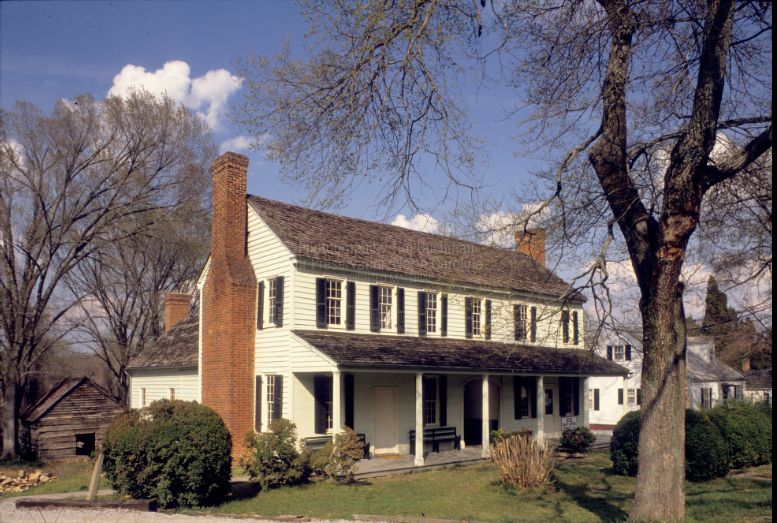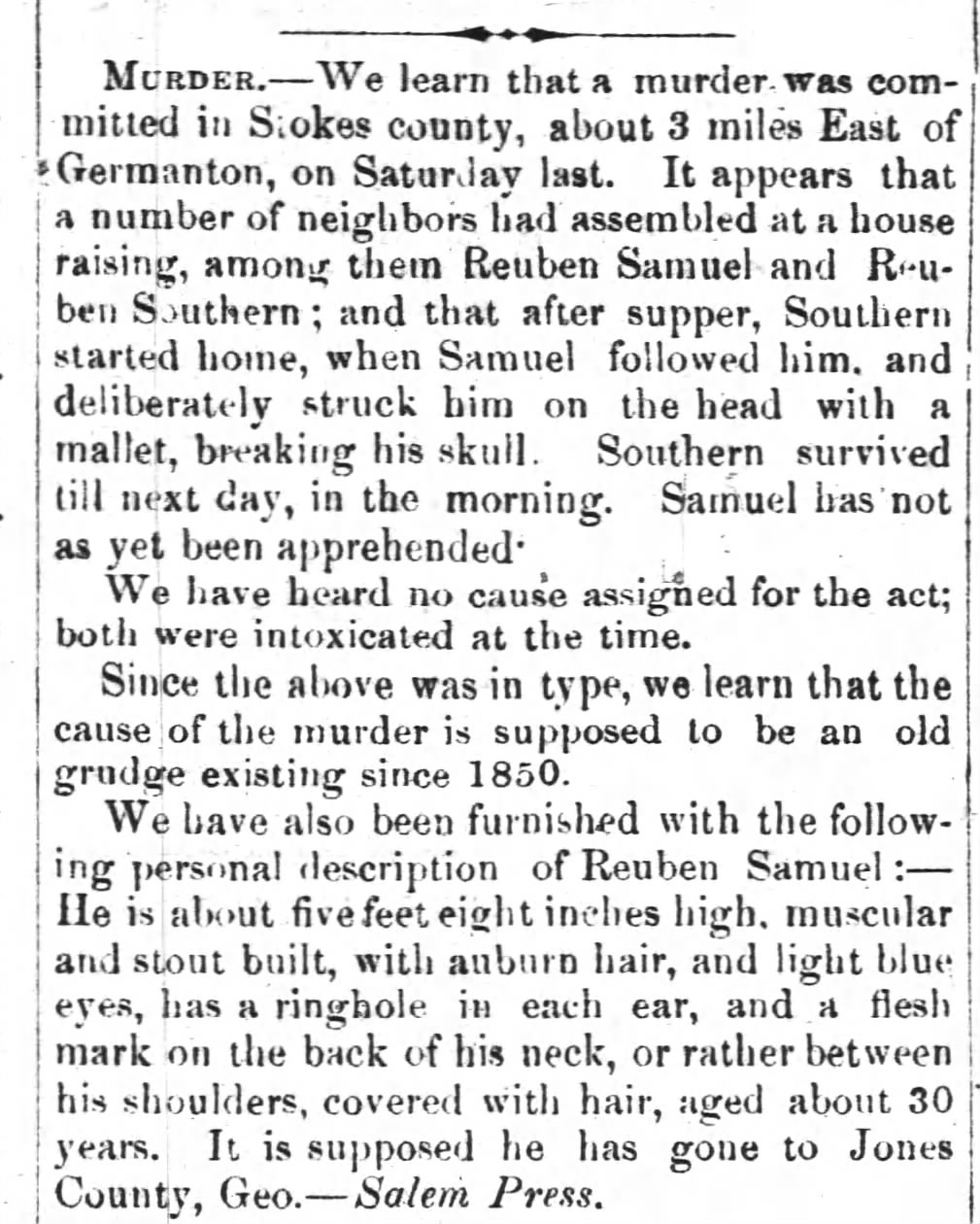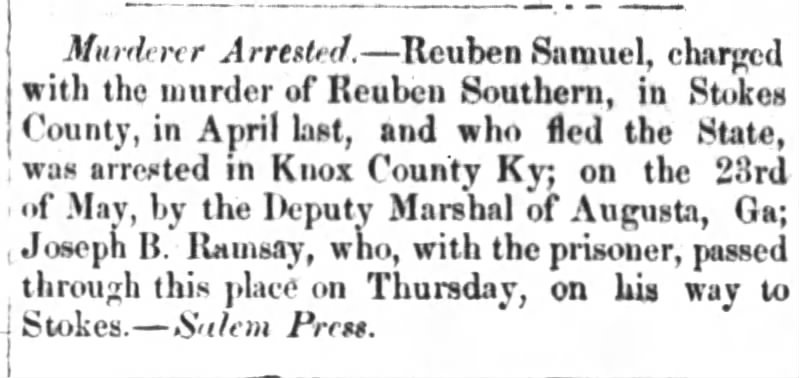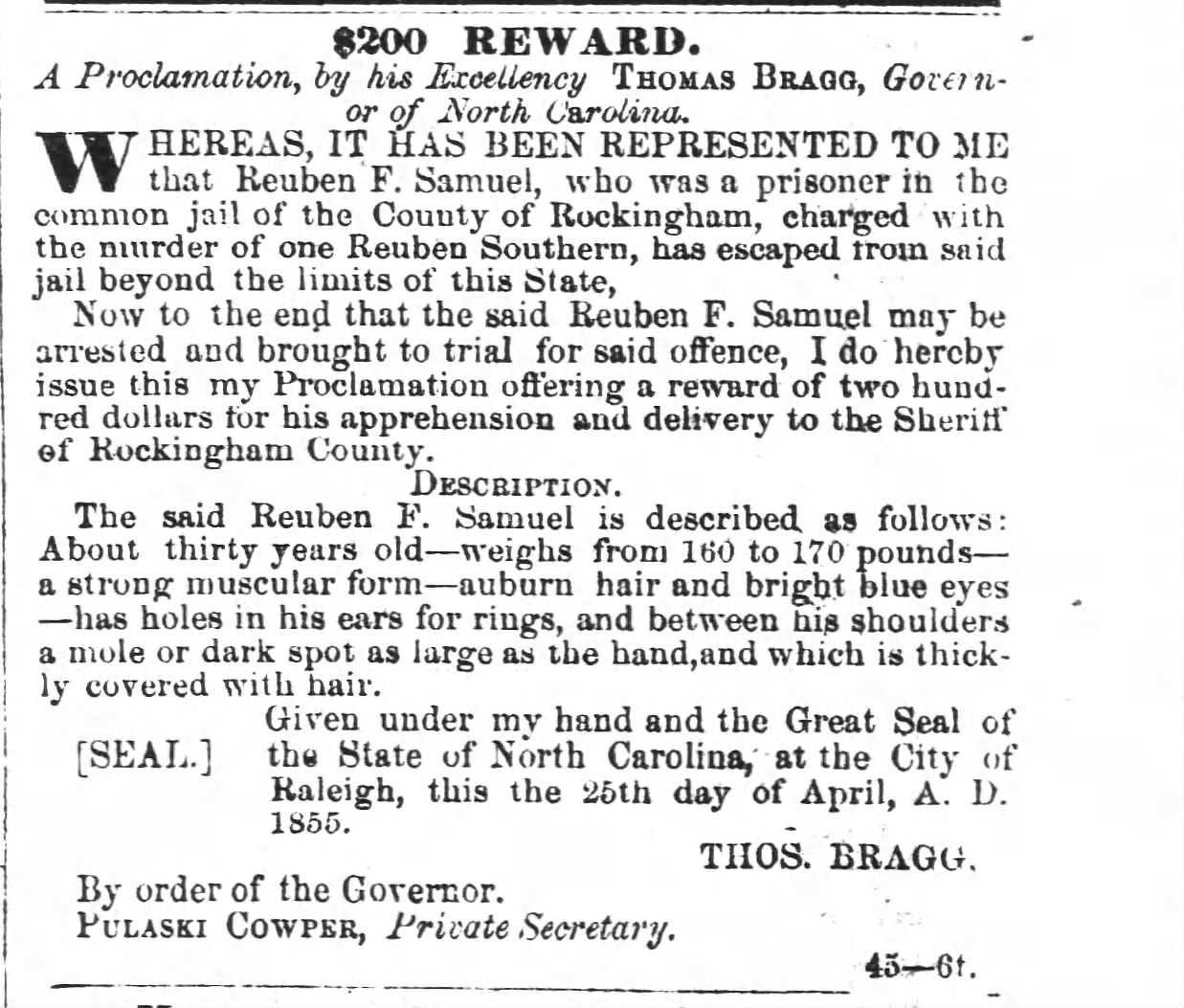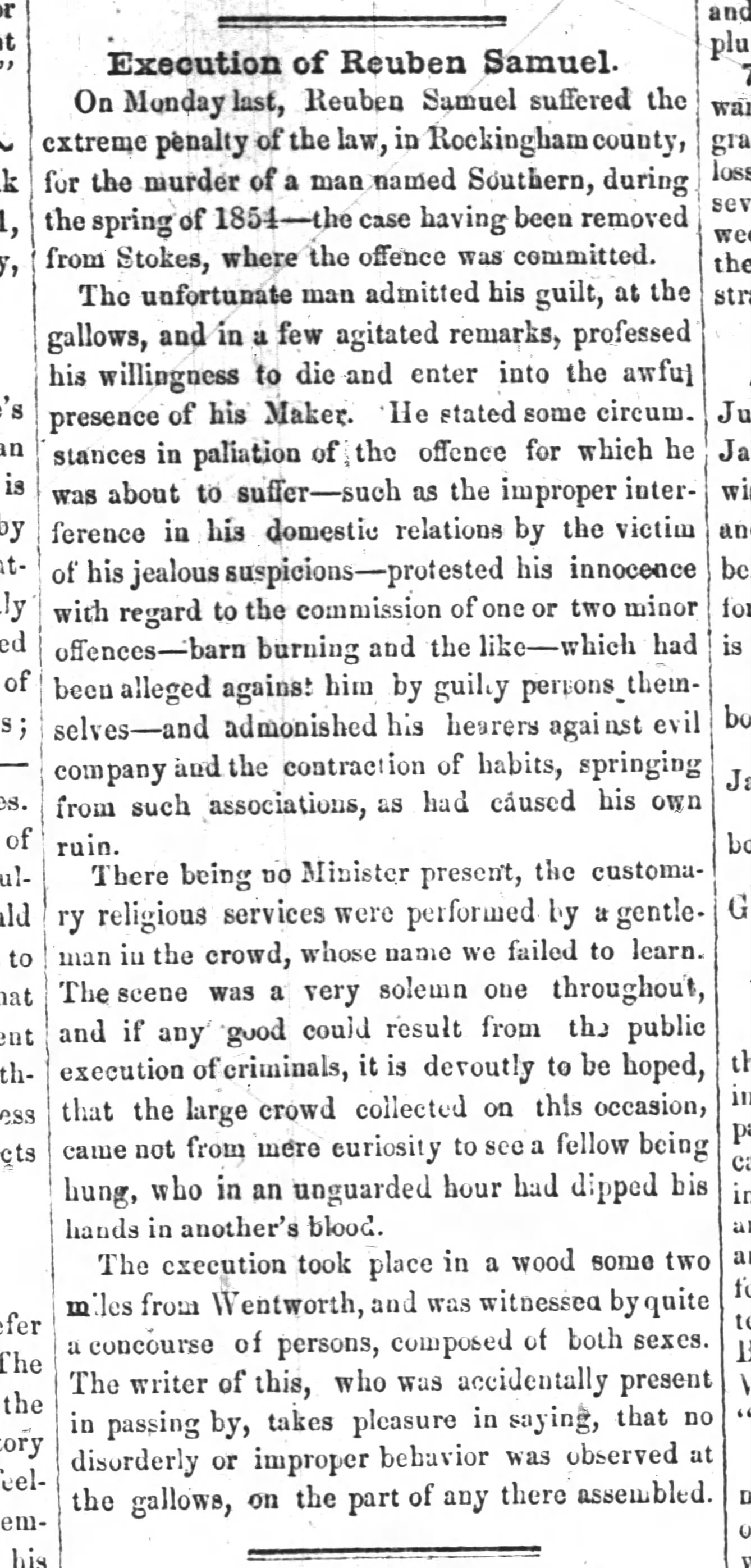Return to Home Page
THE MURDER OF REUBEN SOUTHERN
Stokes County, North Carolina
April 1854
Michael T. Southern
Raleigh NC
August 14, 2021
Please Note: This is a sad story story and may cause discomfort in researchers who would prefer not to consider darker aspects of family history.
On the night of April 8, 1854, during a social gathering at a house near Germanton in Stokes County, Reuben H. Southern, a woodworker in his late 20s and married with two young daughters, was assaulted by a man named Reuben F. Samuel. Reuben Samuel, a farm worker, was about 30 and also married. At about ten or eleven PM, a short distance from the house, Samuel forcefully struck Southern in the head three times with a wooden mallet, and Southern died of his injuries the following morning. Samuel fled the state, but was captured after six weeks and brought back to North Carolina for trial, which was moved from Stokes to neighboring Rockingham County. Samuel was convicted of murder and hanged on June 16, 1856 near Wentworth, the Rockingham County seat.
Some might feel a measure of sympathy for Reuben Samuel because of the circumstances behind the tragedy. The record of Samuel's trial stated "There was evidence tending to show that the deceased [Reuben Southern] was in the habit of adultery with the prisoner's [Samuel's] wife." Samuel appealed to have the charge reduced to manslaughter because he had committed the act as an aggrieved husband. The North Carolina Supreme Court ruled that because Samuel had not discovered his victim in the actual act of adultery with his wife, he could not be said to have been overcome by that "furor which for the moment unsettles reason," which would have extenuated the crime to manslaughter. Instead, he had killed Southern "deliberately & from revenge," which is murder.
The Characters
Reuben Southern, the victim, was born in Stokes County between 1824 and 1828, a son of Stephen and Rachel Southern. The 1850 census, the only census in which he appears by name, shows his age as 22, suggesting he was born in 1828 or late 1827. An online family history source gives his birth as 1824. His namesake was his grandfather Reuben Southern I, who came to North Carolina in 1774 or 1775 from Virginia with William and Magdalen Southern and other family members. With the division of Forsyth County from Stokes in 1849, the household of Stephen and Rachel Southern, as well as those of their older children living near them and other close neighbors, fell on the south side of the new county line, in Forsyth.
In 1850 the young Reuben Southern was a laborer in the Forsyth County household of David S. Westmoreland, a 22 year old chair maker. A century later a descendant of one of Reuben Southern's daughters, citing family tradition, wrote that Reuben was a casket maker, adding "I am told he made some of the most beautiful mahogany caskets ever seen in that part of the state." Mahogany is not indigenous to the region, and it is unlikely that the expensive wood was imported for use in caskets. But that tradition and Reuben's presence as an assistant in the shop of chair maker David Westmoreland indicate he was trained in woodworking. By 1860 David Westmoreland relocated to Thomasville in Davidson County, site of a station on the newly constructed North Carolina Railroad, where he became a pioneer in the nascent furniture industry there.
In the mid-1800s the Westmoreland and Southern families in Forsyth County were closely connected through intermarriage. David S. Westmoreland was married to Reuben's sister Julina Southern, and after Julina's death in 1863 David married Nancy Southern, another daughter of Stephen and Rachel and sister to Julina and Reuben. In 1850 Stephen and Rachel Southern were close neighbors to David Westmoreland and other Westmoreland households. Two other of Stephen and Rachel's sons also lived nearby with their families: George Southern, who married "Mina" Westmoreland in 1846, and William Southern, married to Malinda Marshall.
Not long after the 1850 census was taken, Reuben Southern married David's sister Delana Westmoreland [variously spelled Delania, Delany, and Delanie]. Before Reuben's death in April 1854, Delana had two daughters, Rachel (b. 8/1851) and Charity (b. 12/1853). Upon his murder, Reuben left Delana as a 21 year old widow with the two small daughters, one aged 2 years, the other 4 months. In 1863, nine years after Reuben's death, Delana married William W. Petree in Stokes County, and their son Solomon was born in 1865. Delana eventually moved to Thomasville near her brother David's family and lived until 1911. Her daughters by Reuben Southern and son by Mr. Petree lived full lives, and at least thirteen children were born between them. (See FindaGrave entries for Delana Westmoreland Petree and her parents, siblings, and descendants.)
The 1850 Stokes County census shows Reuben F. Samuel, age 26, in the household of Asahel Hart, 41, with Hart's wife Verlinda and seven Hart children. Samuel evidently was assisting the Harts on their family farm. Previous censuses show several Samuel households in Stokes County, but as they do not name children it is not possible to identify Reuben Samuel's parents without additional documentation. Reuben Samuel married Mary Young in Stokes County in December 1850, after the census was taken that year, probably about the same time Reuben Southern married Delana Westmoreland. It is not known if the Samuel couple had any children by 1854. After Reuben Samuel's execution, his widow Mary may have remarried and/or moved to another county or state, but she has not yet been identified in later censuses or other records.
Two descriptions of Reuben Samuel distributed when he was a fugitive indicate that he was about five feet eight inches tall, 160 to 170 pounds, "of strong muscular form," with "auburn hair and bright blue eyes", "a ringhole in each ear," and "between his shoulders a mole or dark spot as large as the hand, and which is thickly covered with hair."
The Events
Documents from the trial give details of the case, and newspaper accounts from the time provide other information. On the night of April 8, 1854, Reuben Samuel, his wife, mother-in-law, and sister-in-law were at a house somewhere east of Germanton in southern Stokes County. Reuben Southern and other persons were also present. A newspaper account [below] described the gathering as a "house raising," and after sunset it become something of a party with alcohol consumed. At ten or eleven o'clock Samuel's wife left the scene with her mother and sister. Reuben Southern also left and followed them. Believing that Southern "was going off with his wife for the purpose of adultery with her," Reuben Samuel immediately followed after Southern. "Some 15 or 20 steps from the house and within some 2 or 3 steps of his (prisoner's) wife," Samuel struck Southern in the head three times with a wooden mallet, fracturing his skull. Southern lived through the night, but died from the injuries the morning of April 9.
Reuben Samuel fled North Carolina and was fugitive for about six weeks. The newspaper report of the murder [see below] states that "It is supposed he has gone to Jones County, Geo." (near Macon in central Georgia). If he first escaped to Georgia, he was pursued into Kentucky by Georgia lawmen. According to another news report [below], he was arrested on May 23 in Knox County, KY by the Deputy Marshal of Augusta, GA, and brought back to Stokes County in early June.
Awaiting trial in mid-1854, Samuel or his representative requested and received a change of venue for the trial from Stokes County to Rockingham County, because "the popular mind has been affected and improperly and unfairly prejudiced in advance against him to such an extent that he cannot have a fair and impartial trial in the County of Stokes." He was transferred to the Rockingham County jail in Wentworth.
Wright Tavern, Wentworth, built 1816 with later additions, was standing in 1854-56 when Reuben Samuel was being held in the adjacent Rockingham County jail. The 19th century courthouse and jail where Samuel was tried and incarcerated were replaced in the early 20th century. Credit: Tim Buchman Photography, Preservation North Carolina.
Doubtless fearing his chances in court, Samuel escaped from the Wentworth jail on April 29, 1855. A $200 reward for his capture was ordered by Governor Thomas Bragg and widely published in regional newspapers. He was at large only a few days, as he was apprehended and returned to jail in early May.
Samuel was convicted of murder in the fall 1855 term of Rockingham County Superior Court and sentenced to be hanged in December 1855. He appealed to the North Carolina Supreme Court to seek the reduction of the conviction to manslaughter because of the extenuating circumstance of Reuben Southern's adulterous affair with Samuel's wife. In early 1856 Chief Justice Frederick Nash ruled that "If the prisoner had caught the deceased in the act of adultery with his wife then slain him on the spot, the crime would have been extenuated to manslaughter, the provocation being considered in law a legal one as producing that furor which for the moment unsettles reason. But if the adulterer is not slain on the spot, and sufficient time has elapsed for the passions to cool, the crime is not extenuated to manslaughter, but the slayer is guilty of murder." Chief Justice Nash's ruling cited extensive precedent, and concluded that there is "no error" in the handling of the case by the Superior Court of Rockingham County.
Following that ruling, Samuel was sentenced to be hanged on Monday, June 16, 1856. A poignant account by an unidentified contributor to The Greensboro Patriot of June 20, 1856 [below], described the execution, which took place "in a wood some two miles from Wentworth" in Rockingham County.
Sources:
Documents related to the story were provided to the author about 1977 by Ellen Pepper Tilley of Germanton, NC. These included: (1) Photocopies of a selection of pages from the handwritten record of the trial of Reuben Samuel in Rockingham County Superior Court. The documents are identified as "Records of N.C. Supreme Court 1855 - Case #5760." (2) Photocopy of a typed letter written January 9, 1958 by Mrs. Ruth Yarbrough Horne of Bradenton, Florida, to Miss Ruth Petree of Germanton, NC. Mrs. Horne was great-granddaughter of Reuben and Delana Westmoreland Southern through their daughter Rachel Southern Boles and granddaughter Bertha Boles Yarbrough. The quote about Reuben Southern being a casket-maker comes from this letter.
Selected Newspaper Clippings from Newspapers.com
April 1854 - The Murder
Notice appearing in the Southern Weekly Press (Raleigh NC) on April 29, 1854,
taken from its earlier publication in The Salem Press (Forsyth County NC).
This notice was widely published across the state and beyond.
Image from Newspapers.com
June 1854 - Reuben Samuel arrested
Notice of the arrest of Reuben Samuel in Kentucky on May 23, 1854, appearing
in The Greensboro Patriot (Greensboro NC) on June 10, 1854,
taken from its earlier publication in The Salem Press (Forsyth County NC).
Image from Newspapers.com
November 1854 - Change of venue for trial
Reuben Samuel (or his representatives) successfully argued for a change of
venue for his trial from Stokes County to Rockingham County, because gossip
about the crime in Stokes would have made it impossible for him to receive
a fair trial in Stokes. This notice appeared in The People's Press (Winston-
Salem, NC) on November 11, 1854. Image from Newspapers.com
May 1855 - Escape from jail
Notice of the escape of Reuben Samuel from the Rockingham County jail
at Wentworth and his recapture appearing in the Richmond Dispatch
(Richmond VA) on May 9, 1855. Image from Newspapers.com
May 1855 - Reward offered
Notice by Governor Thomas Bragg offering a reward for the capture of Reuben
Samuel after his escape from jail at Wentworth on April 29, 1855, published in
The Weekly Standard (Raleigh NC) on May 2, 1855.
Image from Newspapers.com
February 1856 - State Supreme Court ruling
Short statement of N.C. Supreme Court Chief Justice Frederick Nash's ruling
there was "no error" in the murder charge against Reuben Samuel, who had
appealed to have his charge reduced to manslaughter. From The Wilmington
Daily Herald (Wilmington NC), published February 7, 1856.
Image from Newspapers.com
May 1856 - Conviction
Notice of Reuben Samuel's conviction and sentencing, appearing in The People's Press (Winston
or Salem, NC) May 23, 1856. Image from Newspapers.com
June 1856 - Execution
Poignant account of the hanging of Reuben Samuel, written by an unnamed contributor
to The Greensboro Patriot (Greensboro NC) and published on June 20, 1856.
Image from Newspapers.com
